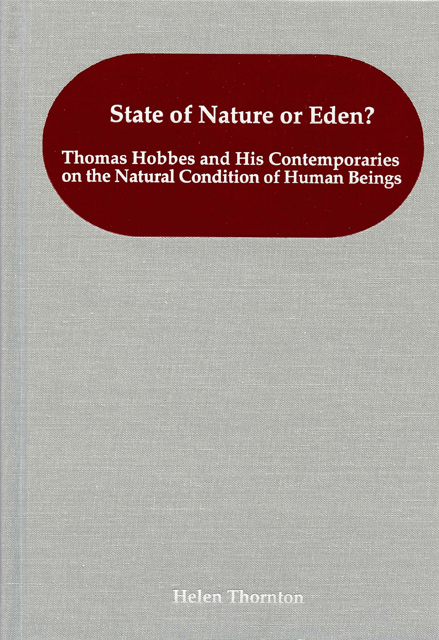 State of Nature or Eden?
State of Nature or Eden? Summary
READING HOBBES’ STATE OF NATURE
This book has argued that Hobbes’ seventeenth century readers brought their own reading of both the Bible, and scriptural commentaries, to their reading of Hobbes’ political theory. It was their own views on the account of the creation and Fall, which determined their response to Hobbes’ description of the state of nature, and these views were in turn determined by the particular interpretations of Genesis, which the individual reader subscribed to. Tom Sorell has argued that Hobbes seems to have assumed a knowledge of the account of the Fall as common ground between himself and his readers. And yet, the Fall and its consequences were interpreted in a variety of ways. For those of Hobbes’ contemporaries, who felt strongly enough to go into print against him, his account of the state of nature was thought to completely contradict scripture. But the response of Hobbes’ seventeenth century critics is not necessarily a good basis to judge his fit with the religious culture of the age. Hobbes was writing at a time of theological change. He had been educated in a Calvinist world, but was read by his contemporary critics in a world in which Calvinism was waning. This book has shown that Hobbes seems to fit better into an Augustinian, Calvinist, and particularly Lutheran context. For those of Hobbes’ readers who subscribed to Augustinian, and Reformed interpretations of the scriptural account of the creation and Fall, there were a number of important parallels to be seen, although on some aspects of the state of nature Hobbes could have been understood to have subverted scripture. Further, Hobbes’ account of the state of nature appears to have combined elements of both the pre-lapsarian and postlapsarian conditions. This might have been because Hobbes’ analysis of human nature could be understood to have taken into account aspects of both perfect human nature, as well as fallen human nature. Since the Fall there had come into existence two types of human beings—the elect and the reprobate. Further, because we could not distinguish between these two types of human beings from their actions, it was safer to assume that all men fell into the category of the reprobate.
- Type
- Chapter
- Information
- State of Nature or Eden?Thomas Hobbes and his Contemporaries on the Natural Condition of Human Beings, pp. 164 - 177Publisher: Boydell & BrewerPrint publication year: 2005


